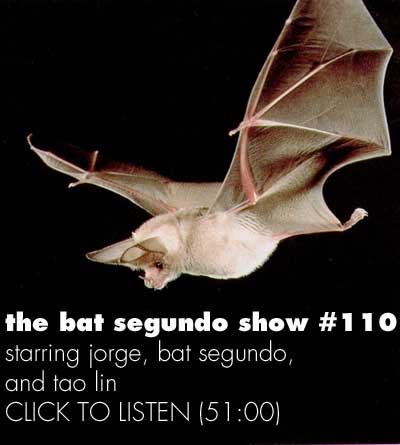Reports from the Los Angeles Times Festival of Books blogging panel are coming in:
Carolyn Kellogg: “Instead I would have loved to have a topic like: ‘litblogs — what’s good, what’s bad, what’s next?’ I know what I’d like to do more of (I think it’s a congenital blogger condition to be cursing oneself for not fill-in-the-blank), but I want the bigger picture. What does it take for a litblog to be successful – voice? genre? regular posting? Have we made any big mistakes (like engaging n+1 in an argument over an article critical of litblogs — an article they never put online)? What exciting, fun things are happening in the litblog world? I would have loved to hear what Tod and Ron and the audience thought.”
Ron Hogan: “I spent most of my time veering away from the money question (after pointing out that I’d figured out how to get paid) and hammering at the notion that online media is inherently less reliable and more susceptible to corruption than its traditional counterparts, and, in the particular case of book reviewing, the online media were frankly picking up the slack for the dwindling coverage in print. Somewhere along the line, Keen said something like, ‘I just think we have enough media already.’ Frankly, I sorta boggled, and called that an incredibly stagnant notion. ‘We have enough books already, too, but we keep publishing new ones,’ I went on. ‘We have enough movies to watch… The horse and buggy was a perfectly good way to travel, what do we need cars for?’ (I’m slightly paraphrasing here; the transcripts and, with luck, an audio recording of the event should be available online one day from the Times.)”
BookFox: “What I found disconcerting was that the panel seemed to revolve around Andrew Keen – his book and his assertion that the only possible model for online content is one that pays financial dividends. Everyone kept mentioning his book The Cult of the Amateur – usually attacking one premise or another – and for most of the conversation, the panel focused on the problem of money. So it seemed that rhetorically, the conversation revolved around rebutting Keen’s arguments, giving him the high argumentative ground, rather than the bloggers being able to establish a neutral space to discuss the facts.”
The Elegant Variation: “Keen’s overriding concern was with the absence of a sustainable business model in the blogosphere, and the problems inevitable for institutional media once the audience gets hooked on free content. As a corollary, when the institutions falter, the superiority that Keen claims for professionalism disintegrates. He claimed that a form of expression that anyone can do is so easily imitable that the risks of corporate corruption and abuse are huge, and the reader is vulnerable not only to some weak-ass literary criticism but out-and-out fraud.”
My response to the muddled arguments in the first 30 pages of Keen’s book can be found here. I am hoping to address the book’s balance in future posts.
